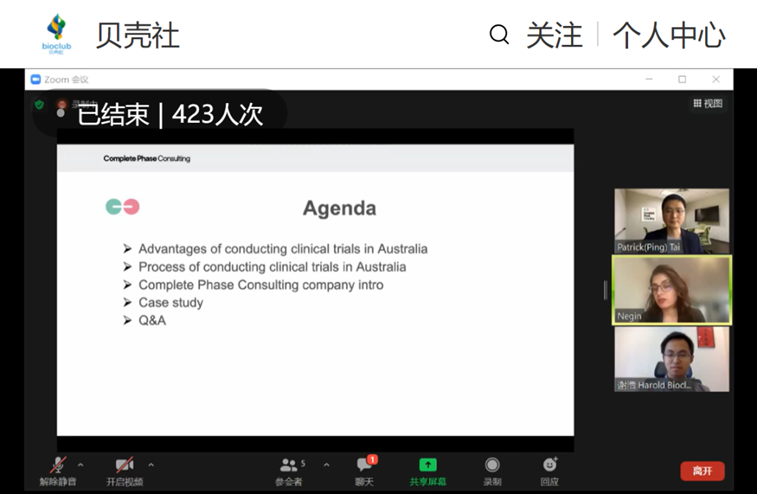(Recap) Successful conclusion to our “Tips to Efficiently Commence Clinical Trials in Australia” Webinar
Bioclub, in collaboration with BioHarbour, the China Australia Medical Innovation Park and Bioclub Australia Innovation Hub, successfully organized the fifth event in its Sino-Aus Life Sciences Collaboration Series on the 28th of July. For this webinar, we were pleased to introduce to our audience, Complete Phase Consulting (CPC) as our presenting partners. Helmed by Ms Negin Rahmani and Ping (Patrick) Tai, managing director and director of Asia Pacific business respectively, along with Hao (Harold) Xie of Bioclub, the session provided an in-depth look at how global life sciences companies and biotechs can efficiently negotiate the steps required to kick-start clinical trials in Australia.
Negin and Patrick presented the bulk of the content in both English and Mandarin respectively, kicking off with highlighting the advantages of conducting studies in Australia, before taking a deep dive into the operational aspects and process of conducting trials Down Under. They then gave an overview of the assistance and services CPC provides to clients in setting up their clinical trials before dissecting a couple of case studies. A 15-minute Q&A session rounded off the webinar, with Negin and Patrick each taking turns to answer some burning questions from our virtual audience.
"Rapid start, affordable, assured quality"
Great attractors for pharmaceuticals to conduct clinical trials in Australia
As companies such as Hengrui Pharmaceuticals and CStone Pharmaceuticals have consecutively commenced conducting studies in Australia, the Land Down Under has gradually become one of the preferred destinations for a growing number of global pharmaceuticals to carry out clinical trials. As highlighted by Negin and Patrick during the webinar, the process of administering approvals for Phase I clinical trials in Australia is governed by an independent ethics committee, which is significantly different from the processes undertaken in most other jurisdictions that require a pre-IND meeting and review process.
Depending on the preparation of material required to submit an ethics application in Australia, the timeframe from the submission of such documents till the receipt of the result for the application might be in the vicinity of 6-8 weeks. Factoring in a post-approval two week wait for the submission of a clinical trial notification to the Therapeutic Goods Administration of Australia (TGA), the total duration required for the commencement of trials should take no more than two months, as compared to a long-haul 6–12-monthapplication in China.
Research & Development tax incentives offered by the Australian government actively encourage overseas sponsors to conduct research in Australia. These incentives have also made it attractive for global companies to access Australian research facilities, although sponsors wishing to be eligible for this benefit must establish an affiliate company in Australia (which may take about 1 month). Non-Australian Sponsors should consider this and how they can impact on eligibility for the 43.5% R&D tax incentive provided by the Australian government.
As a result, the cost of conducting clinical trials in Australia is about 60% lower than in most other jurisdictions, e.g., in the United States, whilst the data generated from studies is also recognized by the FDA and EMA.
Key considerations and steps to note prior to commencing trials in Australia
For companies that are new to conducting trials internationally, the initial baby steps to take are typically the most challenging. As also mentioned by Negin and Patrick, to ensure eligibility for the financial perks that come with conducting trials in Australia, it is necessary to first establish a subsidiary company locally.
To ensure smooth progress of the study, the global pharma company will then execute a contract with a clinical CRO. The CRO will then be responsible for assisting its client in selecting clinical trial site(s), proof-reading and submitting application materials to the ethics committee and the TGA. Such documents include but are not limited to the investigator’s brochure, trial protocol, and informed consent forms etc.
Post commencement of the trial, protocol compliance (site monitoring), safety monitoring (adverse event reporting), and any amendments or deviations to the protocol will be managed by the CRO. At the conclusion of the trial, the database will be locked two weeks after completion, with all files and documents reviewed and archived.
For more information that was discussed during and after the webinar, including Q&A session content, please click here for a link to our FAQ sheet.
This event ultimately provided global life sciences, biotechs and pharmaceutical companies with a deeper understanding and appreciation of the key points to note regarding starting-up clinical trials in Australia, it pros and cons and how to take that all-important first step.



文章评论(0)